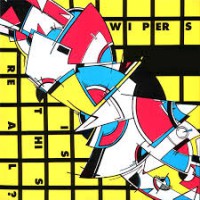Is is possible to be highly influential to an entire wave of popular musicians, yet be consistently overlooked and underrated by the world at large? In the case of the Wipers, this seems to be the unfortunate case. Led by Greg Sage, the Wipers’ sound is so thoroughly part of the make-up of so many bands of the past three decades as to be undeniable, and yet mention of their name often draws blank stares. Despite this, the list of bands who claim influence from the Wipers is impressive, including Nirvana, Dinosaur Jr., Hot Snakes, and the Melvins.
Released in 1979, The Wipers’ Is This Real? was their first full-length album after already gaining solid notoriety in the Portland scene, and within is a stellar mix of tight punk rock and melody, the likes of which had never been heard previous to its release. At times sounding like a dissonant precursor to post-punk and grunge, while at other times like a more raw and aggressive version of the Cars, each song carries its own dark personality and vibe bolstered by kinetic bass lines, tight crunchy guitars and Sage’s harsh yet melodic vocals. Is This Real? is probably their poppiest record, and establishes the Wipers as a band to reckon with, while eclectic-sounding enough song-to-song to allow their eventual evolution towards a more angular post-punk direction.
The album opens with Sage’s grumbling guitar intro for “Return of the Rat,†a song simmering with anger that unmistakably plays sonic ancestor to many of Rick Froberg’s projects such as Hot Snakes and Drive Like Jehu. This is followed by “Mystery,†a poppier song highlighted by Dave Koupal’s energetic bassline and a phenomenally memorable chorus that feels like a classic the first time you hear it. “Let’s Go Let’s Go Away†is another solid song that amps up the rock n’ roll, while “D-7†is a much more somber, dark song that touches upon themes of alienation. This is a topic that Sage revisits many times over within his lyrics, particularly on the song “Window Shop for Love,†a number brimming with anger and a sense of isolation that the Wipers would go on to perfect.
Thirty-five years removed from the release of Is This Real?, the cult of the Wipers remains small yet fanatical. A classic post-punk band that deserve props for their influence upon the world of rock music both underground and mainstream, Is This Real? is a powerful and timeless debut.
